Happy Halloween, darlings!
I didn’t write much this month. The other day, I realized I hadn’t written a journal entry in over a month. Sometimes, processing requires energy I don’t have, but perhaps processing also happens in stillness, quiet reflection, rest, caring for your body, and simply slowing down. I was fortunate enough to take my first vacation out of the country in over a year this month, and I did nothing but lay on the beach and read books. It was amazing.
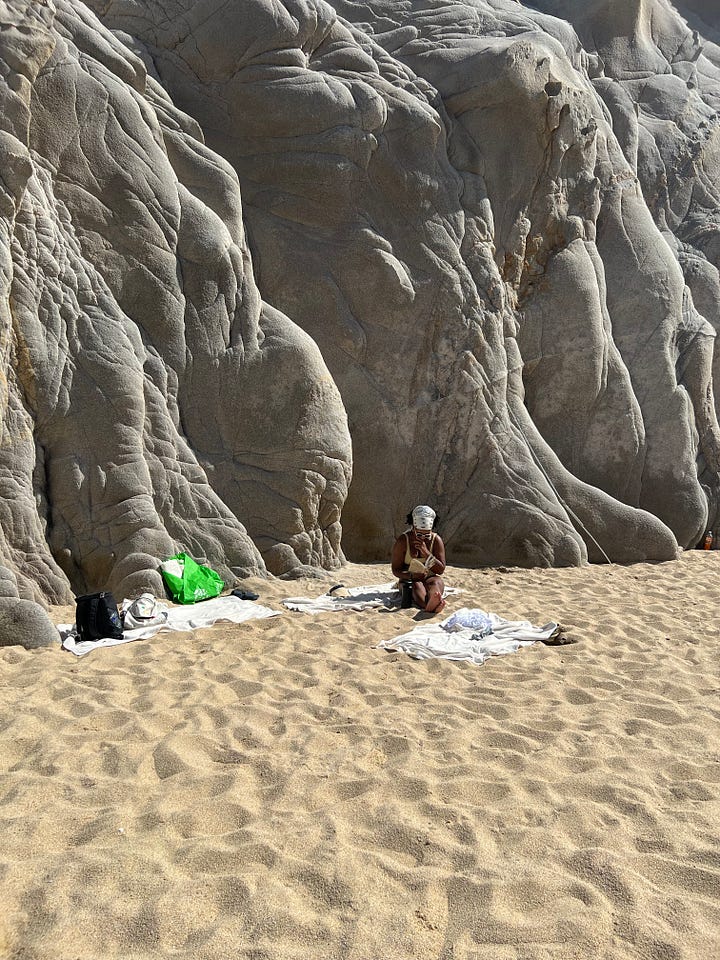

I thought I would come back to the States energized, but returning to the reality of our neverending political chaos and the lightning-speed pace of New York City felt like being tossed into the spin cycle after blissfully hanging in the breeze on a clothesline (don’t ask me why I just compared myself to laundry, I’m sleepy). I had planned to dress up for Halloween this year, but I’m too overwhelmed to be festive. Last year’s costume is a little hard to top, anyway. I usually like to spend October indulging in horror, but reality is already scary enough, so I didn’t watch as much as I typically would have. I finished one horror trilogy and watched a couple of thrillers, but I mostly leaned toward drama this month. Let’s get into it.
Thrillers that trigger
TW: sexual exploitation
The Handmaiden (2016)
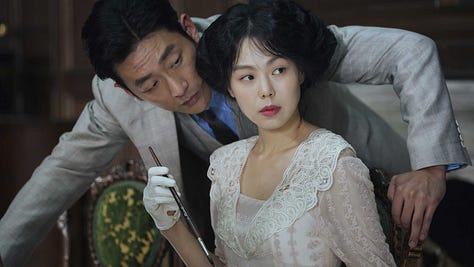

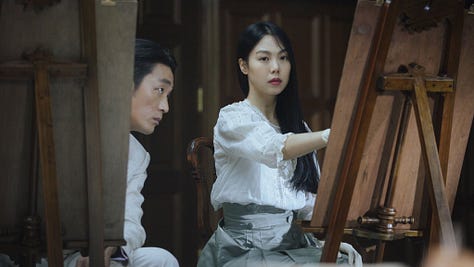
Nothing is what it seems when Count Fujiwara (Ha Jung-woo) conspires with pickpocket Nam Sook-hee (Kim Tae-ri) to con Lady Hideko (Kim Min-hee) out of her fortune. The plan is simple: Nam Sook-hee poses as Lady Hideko’s handmaid and encourages her to marry Count Fujiwara, but as secrets are uncovered and emotions get in the way, the story takes unexpected twists and turns. Directed by Park Chan-wook, The Hand Maiden is a triptych based on the crime novel Fingersmith by Sarah Waters. I like that this film reimagines a Victorian-era period piece by changing the setting to 1930s Japan-occupied Korea. What I did not anticipate from reading the synopsis was the erotica and sexual exploitation in this film. Some folks took issue with the directorial approach to the sex scenes (similar critiques were made of Blue Is The Warmest Color), but at face value, it’s an intriguing thriller that takes you on a wild ride.
[Streaming now on Amazon Freevee]
Blink Twice (2024)
Tw: sexual assault, rape.



When Frida (Naomi Ackie), an thirsty impressionable cocktail waitress meets tech billionaire Slater King (Channing Tatum) at a gala, he invites her and her bestie Jess (Alia Shawkat) to his private island. What starts as a spontaneous idyllic getaway quickly turns into a dark, drug-fueled haze that turns Frida and the other women on the island into prey. This film takes thematic and visual cues from films like Get Out, Midsommar, A Promising Young Woman, Ready or Not, and Triangle of Sadness, as it attempts to make commentary on the predatory nature of the elite, rape culture, and repressed trauma. There were a couple of plot holes and many critiques about the approach to the subject matter not offering anything new or pushing conversations around sexual abuse further, but in terms of performances, aesthetics, sound design, and pacing, I thought it was a solid directorial debut for Zoë Kravitz.
[Now in theaters]
Finishing out the X trilogy
I watched Ti West’s film X when it came out in 2022, and while it was moderately entertaining, it didn’t feel original to me. To me, it played like a stylized blend of Texas Chainsaw Massacre and Boogie Nights. There were moments where I struggled to take it seriously because I was laughing at moments that I’m not sure were meant to be funny (Pearl’s decrepit ass begging someone to fuck her, Kid Cudi’s ridiculous prosthetic penis, lmao) So, I wasn’t in a rush to see the rest of the trilogy, but my partner decided he wanted to watch them, and I didn’t want to get FOMO, so I gave it a shot.
Pearl (2022)
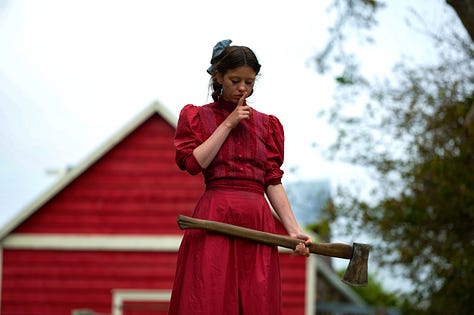
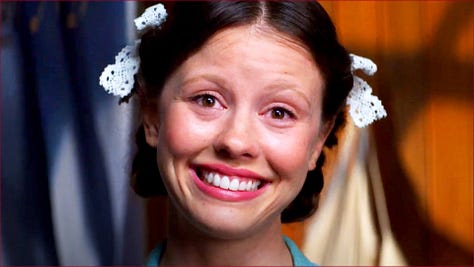

The villain origin story of the titular character, Pearl, is a departure from the erotic slasher approach of X and feels more like a classic horror film. Set on a Texas farm in 1918, Pearl (Mia Goth) exhibits all of the usual signs of a sociopath in the making: a mother who hates her, a penchant for killing small animals, and a brand of neurodivergence that gradually evolves into deviance. Desperate to escape her overbearing and verbally abusive mother and her humdrum life on the farm, Pearl is determined to become a star by working as a showgirl and takes drastic lengths to achieve her goal. I watched an interview with Mia Goth where she said The Shining was her favorite film, and Shelley Duvall is her North Star, and it tracks. There is a scene in this film where Pearl doesn’t get what she wants, which will be imprinted in my mind the same way the “Here’s Johnny!” scene is. I’ll be honest: I thought Mia Goth was typecast before seeing this movie and wasn’t sure about her range, but her performance was terrifyingly brilliant.
[Streaming now on Netflix]
Maxxxine (2024)
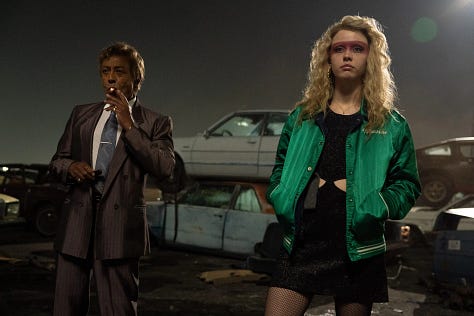
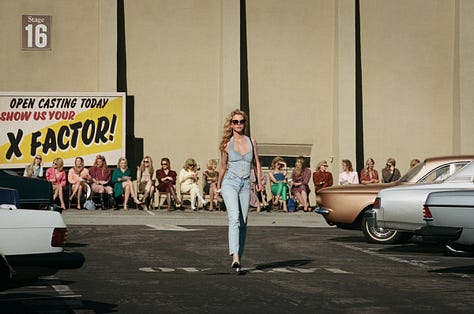
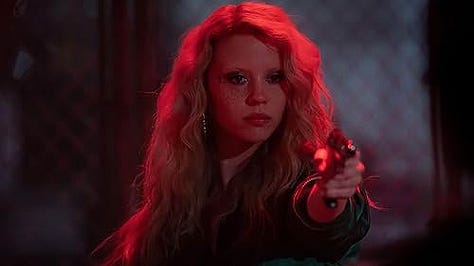
In the final installment of the X trilogy, Maxine Minx (also played by Mia Goth) takes center stage as she attempts to transition from being an adult film star into a respected actress. Set in 1985 Los Angeles, six years after the murders in the first film, Maxine finds herself in the middle of a web of murders once again. This time, a mysterious serial killer is throwing the police off as they are trying to hunt down The Night Stalker (a real-life serial killer), while Maxine is prepping to make her feature film debut in a horror film directed by a woman who takes her B-movie craft way too seriously. This was probably my least favorite in the series. It has a lot of style, but it didn’t end the trilogy in a way that fully connected the three stories. Sure, both Pearl and Maxine have a desire for a stardom that [spoiler alert] leads them to commit murder, even if for different reasons. Pearl is a cold-blooded killer, whereas Maxine is more “I ain’t a killer, but don’t push me.” This story had potential but ultimately gave into genre tropes without delivering anything exciting or fresh. Still, Mia Goth was able to showcase her range further by playing a character who embodied the confident self-possession that her nemesis Pearl (who she murders in the first film) wants but is too insecure to access within herself.
[Streaming now on Max]
A supernatural romantic ghost story for the ages
Atlantics (2019)
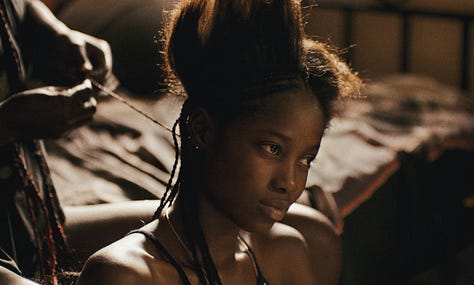
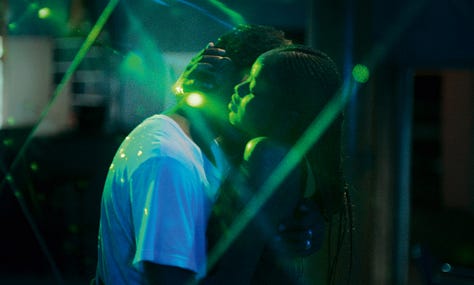
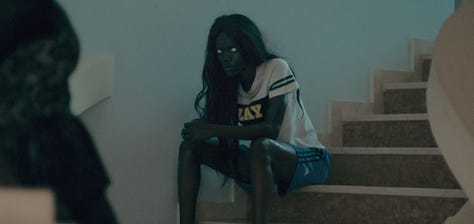
I’ve wanted to watch this film for a while and finally had the time to give it my undivided attention during a flight. Directed by Mati Diop and set in the suburbs of Dakar, Senegal, Atlantics follows the lives of two secret lovers, Ada (Mame Bineta Sane) and Souleiman (Ibrahima Traoré). As Ada awaits an arranged marriage with a wealthier man she doesn’t love, Omar (Babacar Sylla), her future with Souleiman is impacted by the complexities of migration, class, dispossession, exploitation, and ghosts. The Atlantic Ocean, which serves as a backdrop for this story, is an ominous and mysterious presence throughout the film that helps drive home some of the underlying themes about the refugee crisis and how it impacts the people who are bold enough to cross those waters and the loved ones they leave behind. Telling a supernatural story that addresses real-life issues is difficult to do well, but Diop executed it beautifully in this debut feature film.
[Streaming now on Netflix]
A couple of Southern dramas
August: Osage County (2013)
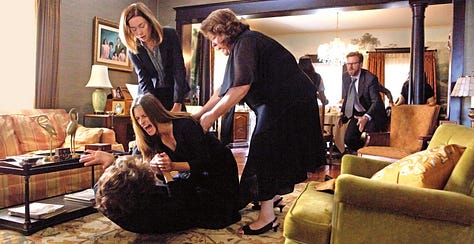
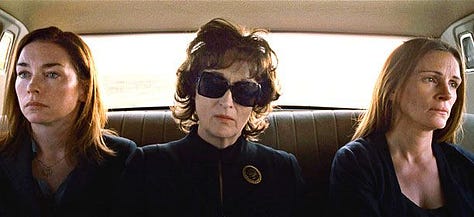
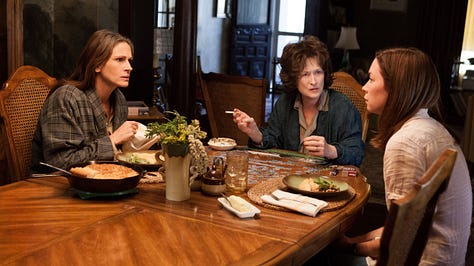
There are few actors I enjoy watching play a villain more than Meryl Streep, so when my partner’s mom recommended this film to me, I immediately added it to my watch list. A film adaptation of the play of the same name written by Tracy Letts (who also wrote the screenplay), August: Osage County is a snapshot of the lives of an incredibly toxic family in the aftermath of their patriarch going missing. Violet (Meryl Streep) is a pill-addicted matriarch who has mouth cancer, perhaps for having a slick ass mouth. The film opens up with her husband Beverly (Sam Shepard) hiring a Native American housekeeper, Johnna (Misty Upham), to help him look after Violet, who is verbally abusive to him. Struggling with his alcohol addiction, Beverly disappears, leaving poor Johnna to care of Violet’s unhinged (and racist)1 ass with the reluctant help of her daughters Ivy (Julianne Nicholson), the middle child who never left home and has a disturbing secret, Karen (Juliette Lewis), the youngest daughter who is so desperate for male validation she overlooks her boyfriend Steve’s (Dermot Mulroney) creepy behavior, and Barbara (Julia Roberts) the eldest daughter who has marital issues of her own. If you think your family is crazy, this film just might give yours a run for their money.
[Streaming now on Peacock]
Passion Fish (1992)
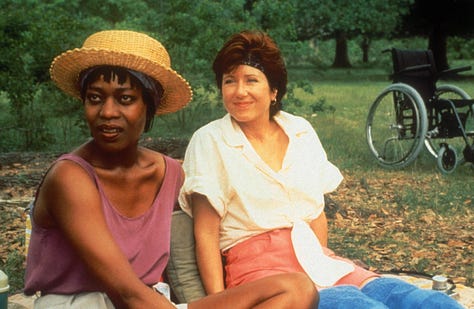

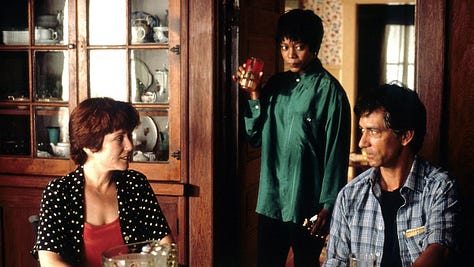
When soap opera star May-Alice Culhane (Mary McDonnell) becomes paralyzed from the waist down after a car accident, she moves back to her empty family home in Louisiana to become a recluse. After going through several personal care assistants who get on her nerves by talking her ear off about their personal lives, she hires Chantelle (Alfre Woodard), who is more than happy to keep her business to herself. I typically loathe films that have Black women play into the mammy trope, but what makes them film different is that Chantelle doesn’t take May-Alice’s shit, she doesn’t hesitate to call her out on her privilege and learned helplessness. May-Alice is also not hiring Chantelle because she is tasking her with work she can’t be bothered to do herself, as many wealthy white women do. She is disabled and depends on Chantelle because she needs to, not because she wants to. We also get a peek into Chantelle’s inner world as she grapples with mistakes that have led her to take this job in the first place. This is a story of an unlikely friendship formed by two guarded women who were resistant to caring for each other beyond professional obligations with a comfort-watch quality characteristic of other films from this era.
[Streaming now on Peacock]
Dark Waters (2019)
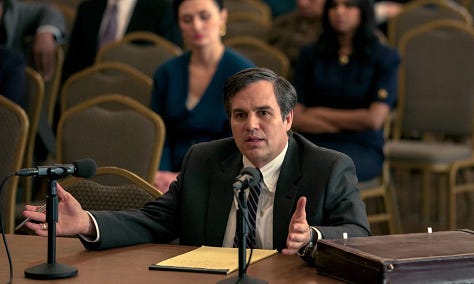
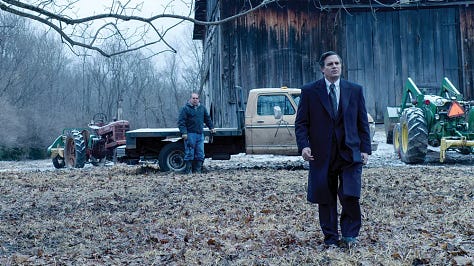
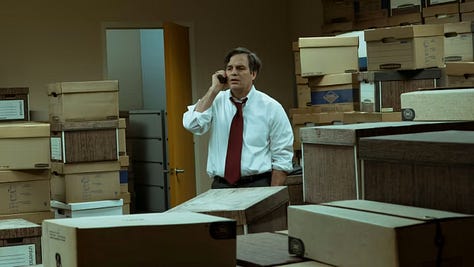
This is technically based in the South and the Midwest, but I digress. Based on the true story of corporate defense lawyer turned environmental lawyer Robert Bilott (played by Mark Ruffalo), who uncovered chemical manufacturing company DuPont’s attempt to cover up livestock deaths related to their contamination of water with perfluorooctanoic acid (PFOA), which is also used in one of their most profitable products, Teflon. This is one of those films that affirms my belief that the government and corporations are slowly killing us all. Ever since I watched this, I’ve been paranoid about using Teflon cookware, but it doesn’t matter because most of us have PFOA in our bodies anyway 🙃.
[Streaming now on Netflix]
Some pre-election day watches
5 Broken Cameras (2011)

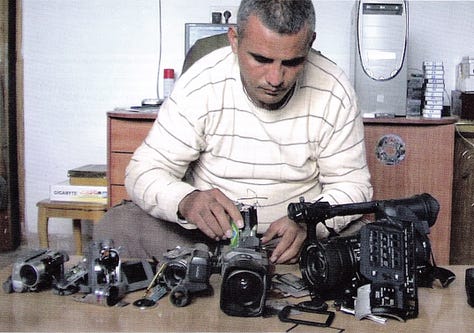

Netflix recently deleted 19 films about Palestinians, claiming that the licenses have expired. Fortunately, they are not the only streaming provider. 5 Broken Cameras is a documentary co-directed by a Palestinian, Emad Burnat, and an Israeli, Guy Davidi. Told through the lens of Burnat’s five broken cameras (that were all broken by some form of violence by the IOF), this film is a first-hand account of what living under Israeli occupation has looked like for Palestinians for decades. This is an important watch for anyone who is not quite sure what settler colonialism looks like or who has yet to understand how staggering the power imbalance is between Palestinians and Israelis, which is why we need to call it a genocide, not a war or a conflict. As we continue to bare witness to the war crimes Israel is committing with United States-funded weapons, we must remember that any rhetoric that proclaims Palestinians deserve a right to dignity, self-determination, and freedom coming from the mouth of someone who is willfully continuing to arm Israel, under the guise of “self-defense” is bullshit.
[Streaming now on Tubi]
Shirley (2024)
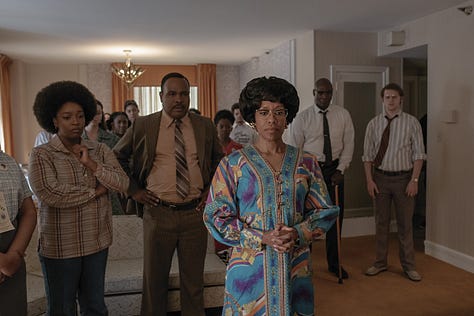
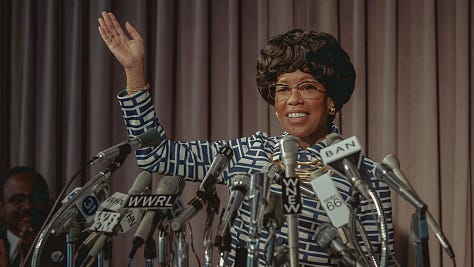
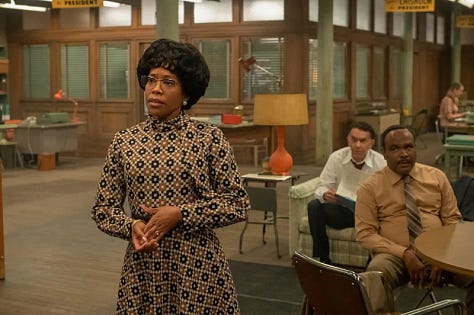
I love me some RANGE-ina King (not to be confused with another one of my favorite actresses, RANGE-ina Hall), and I was so excited when this biopic was announced. In her portrayal of Shirley Chisholm, King imbues the trailblazing politician with the complexity and fervor that led her to become the first Black woman elected to Congress and the first Black candidate for a major party nomination. Set during the early 1970s during her groundbreaking presidential run, Shirley is a digestible entry point into understanding the importance of Chisholm’s legacy. I held off on watching this because, honestly, I was a little turned off by Netflix biopics after Rustin (I love Coleman Domingo, and Bayard Rustin’s story is incredibly important, but the pacing and direction of that film were a little all over the place). I had similar issues with the pacing in Shirley, but I felt it was important to watch this film now to remind me of how important idealism is in politics. Too often, we’re told that asking for what we want is too much, that it’s naive to expect or demand better, and Shirley Chisolm reminds us that we don’t move the needle until we have the audacity to raise our standards for what is acceptable.
[Streaming now on Netflix]
While we’re on the topic of Regina King
I am a grandma and like to watch old sitcoms to fall asleep, the most recent one being 227. I recently watched season 2, episode 12, entitled “A Matter Choice”. In this episode, Brenda (Regina King) is boycotting South African businesses with her friends to stand in solidarity with the anti-apartheid movement. When her father, Lester (Hal Williams), gets the opportunity to construct a new shopping mall with a friend, it presents an opportunity to significantly improve his family’s financial circumstances. When Lester finds out that the company he would build the mall for is on the boycott list, Brenda urges him not to go forward with the job. Lester tells Brenda it’s not that simple, Brenda responds by saying yes it is. A perfect depiction of how young people tend to possess the idealism and optimism that escapes jaded older generations (listen to the children!). To further complicate matters, his friend he was taking the project on with has 50leven kids and doesn’t feel like turning down the opportunity makes sense because South Africa don’t got nothing to do with him, and he has mouths to feed. Later, when Lester is visiting a house he plans to buy with the money from the deal, another Black man who is a contractor (at least I think he was; I was sleepy when I was watching this) reminds him that not too long ago, he wouldn’t have been able to buy a house in that neighborhood. Lester decides not to buy the house to stand in solidarity with the anti-apartheid movement.
There is so much to take away from this episode as we are once again being called to stand in solidarity with anti-apartheid movements abroad. I was impressed that this show was on network television in the late 80s. However, I cannot imagine the same being done for a Pro-Palestinian cause today with all of the media suppression. I wonder if it was easier to make those connections to our struggles and those of people who experience oppression in other countries because, in the 1980s, we were only 20 years removed from the Civil Rights movement. The more time passes, the more hyper-individualistic we become, but that is a post for another day.
Time for tunessss
Tyler, The Creator’s latest album CHROMAKOPIA, has been out for just a few days, so I won’t make proclamations about it other than to say that I love the vulnerability (the way he talks about mid-30s angst is painfully real), Tyler remains one of the last rappers in his generation who doesn’t bore me to tears and he is incapable of making a bad album. It’s been on repeat since it dropped. I have a couple of tracks from it on this month’s playlist, but I think Tyler is one of those artists whose songs sound best when placed within the body of work he’s created as opposed to sprinkled into playlists — especially since IGOR.
As I’ve been curating this month’s playlist, I’ve been thinking about how specific my taste is. I like songs that are groovy, preferably with real instruments (or at least plugins that sound like real instruments). If the instrumentation leans more digital, I like a nice bounce, a bumpin’ 808, or feeling that I’m being transported to another stratosphere. I used to be heavy into lyricism, and I still am, but lately, I’ve been less interested in songs that don’t have rich musicality to back the lyrics. Whisper singers, super stripped-down tracks with just an acoustic guitar or piano, samples that make me want to instantly turn the track off and listen to the original instead, predictable formulas, and songs that fit neatly into one genre are not really for me anymore. Also, I can no longer stand rappers who will boom-bap you to death for the sake of bars or those whose subject matter doesn't evolve. I suppose these are the markers of an old head. When I assess my taste, I can narrow it down to a few prominent sounds (soul, funk, jazz, dance/disco/house, and Afro-influenced— in other words, very Black) that I gravitate towards, and maybe that means I have my own formula and predictability as a curator of music. Taste is distinctive, and I’d like to think I have an adventurous palette, but the truth is probably that I’m one of those people who will try anything once but ultimately knows what they like and sticks with it. What can I say? I like what I like. I start this month’s playlist with “Cosmic Symphonic (Intro)” by Lynda Dawn, which sounds exactly how the title suggests and leads into the affirmational “The Greatest” by Victoria Monet; the rest is just vibes .
If you liked this post, check out previous Watch + Play Lists
Catch me on these digital streets.
Watch My Short Film “One Of The Guys” 🎥
Instagram 🤳🏾
TikTok ⏰
Website 👩🏾💻
Merch 🛍️
💋 ✌🏾
With love,
LaChelle
My biggest critique of this film is that I absolutely hate how Johnna’s character only exists to be the clean up woman and punching bag of this horrible white woman, it’s a lazy racist trope that could’ve been approached differently.


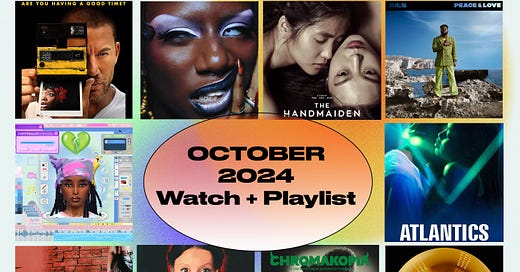


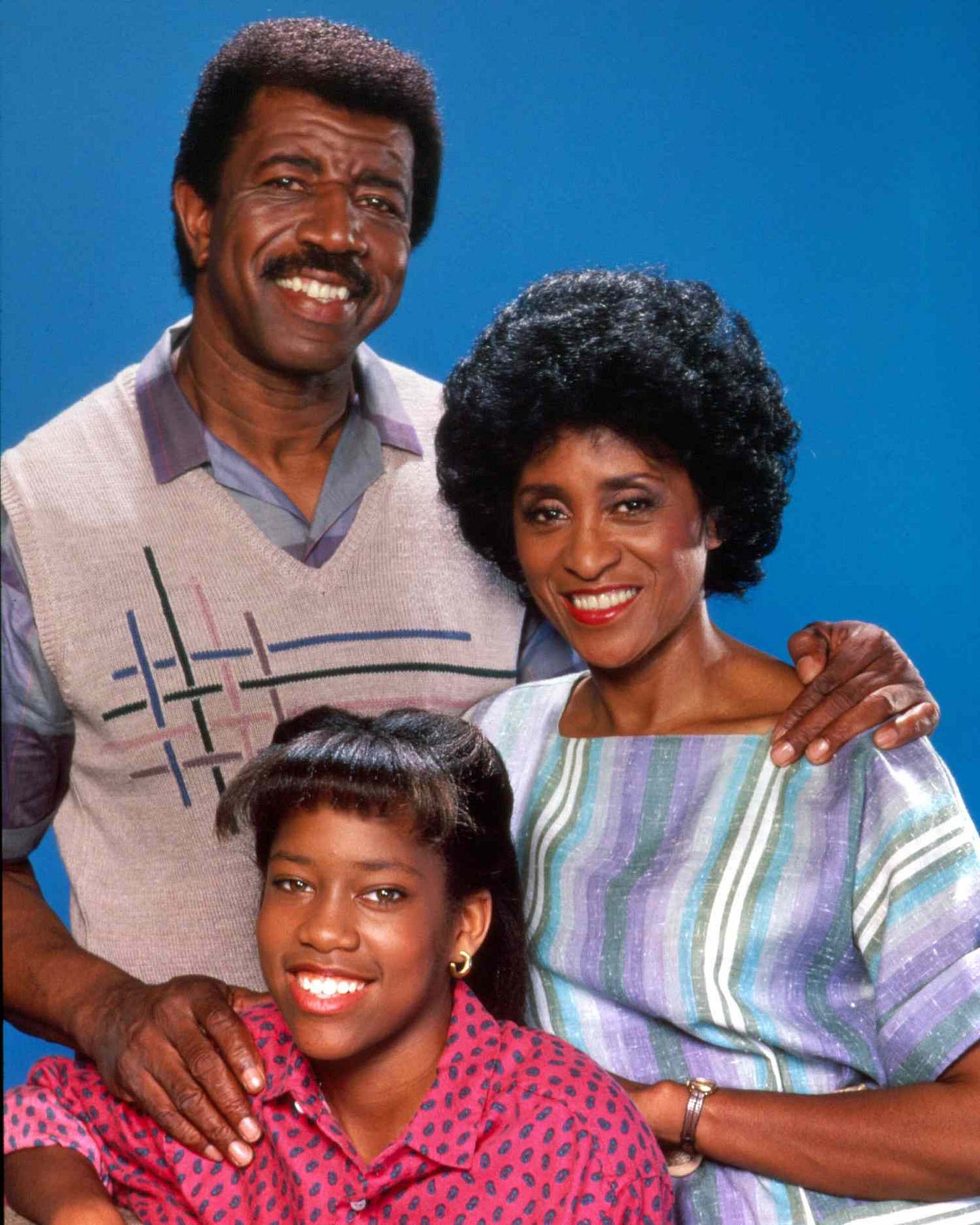
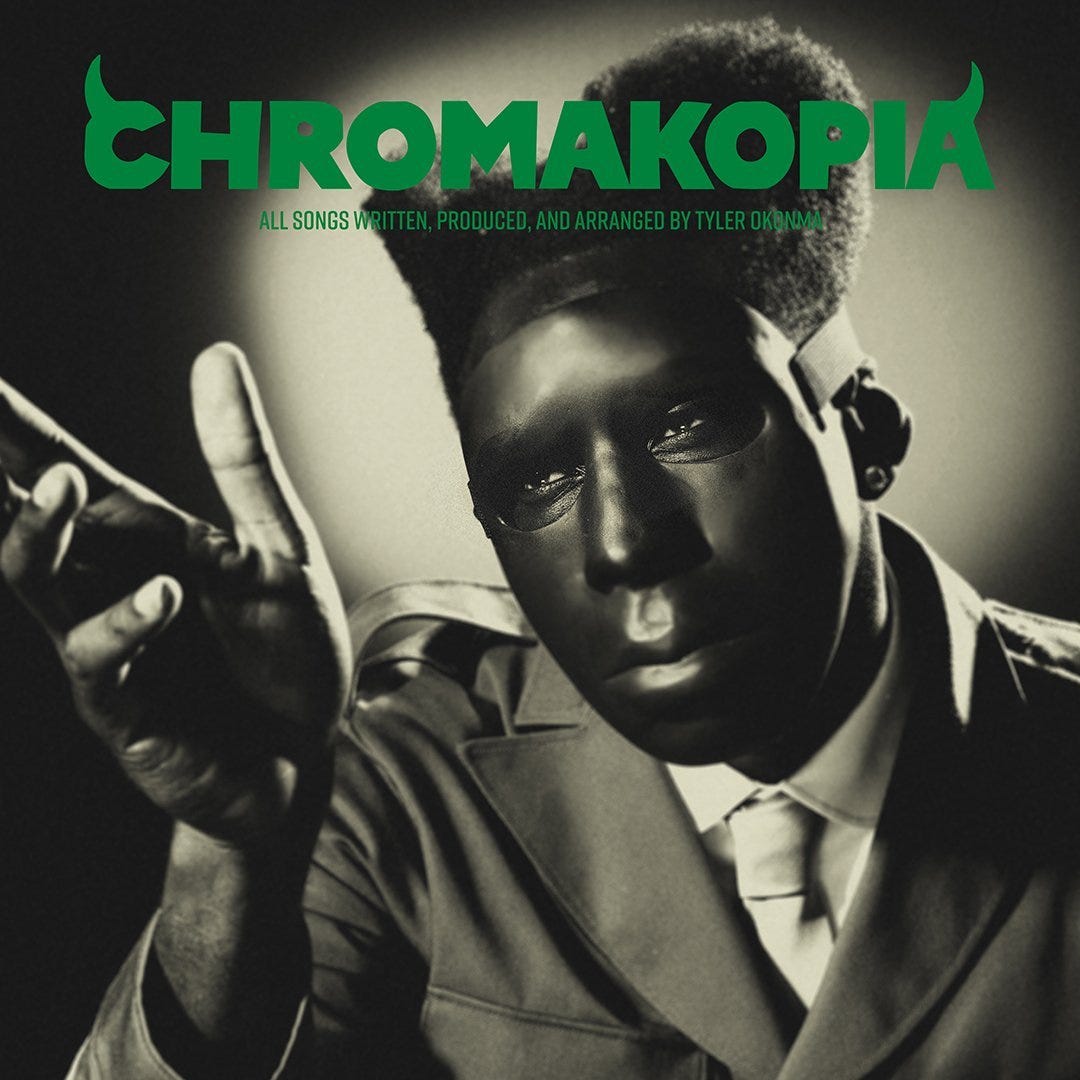



I loved Atlantics so much when I first saw it, it’s one of those films that’s stuck with me. About to check out 5 Broken Cameras. I love these lists!
I’ve only watched The Handmaiden once and I think that’s all I need 😂. Like a lot of Park-Chan Wook’s work, it’s a film that lingers (although this the first time I’m hearing criticisms about it). Definitely need to dive deeper into his filmography when I have a chance and check out ‘Atlantics’ as well 👍🏾